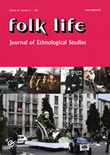
Folk Life-Journal of Ethnological Studies
metrics 2024
Advancing Knowledge in Anthropology and Cultural Studies.
Introduction
Welcome to the Folk Life-Journal of Ethnological Studies, a distinguished publication devoted to exploring the rich tapestry of human culture and ethnological research. Published by Routledge Journals, Taylor & Francis Ltd, this journal serves as an essential platform for scholars and practitioners within the fields of Anthropology, Arts and Humanities, and Cultural Studies. With a publication history stretching back to 1963, the journal has become a valuable resource for disseminating innovative and interdisciplinary research, contributing to a deeper understanding of diverse cultural phenomena. Despite its current quartile rankings of Q4 across multiple categories, 'Folk Life' continues to strive for academic excellence and encourages submissions that challenge existing narratives and offer fresh perspectives. Although not open access, articles published in this journal are rigorously peer-reviewed, ensuring the highest scholarly standards. Researchers, professionals, and students alike will find rigorous and thought-provoking studies within its pages, making Folk Life an important fixture in the academic landscape.
Metrics 2024
 0.10
0.10 0.20
0.20 0.40
0.40 5
5Metrics History
Rank 2024
Scopus
JCI (Web Of Science)
Quartile History
Similar Journals

FOLKLORE
Exploring the Threads of Cultural HeritageFOLKLORE is a distinguished academic journal published by Routledge Journals, Taylor & Francis Ltd, concentrating on the rich tapestry of cultural expressions across time and context. With its ISSN 0015-587X and E-ISSN 1469-8315, this esteemed journal has been pivotal in the fields of Anthropology, Cultural Studies, and History, holding an impactful legacy since its inception in 1890. Currently ranking in the Q2 category in both Cultural Studies and History and Q3 in Anthropology, FOLKLORE is recognized for its significant contributions to the understanding of cultural phenomena and practices. Researchers and scholars will find this journal an invaluable resource, as it explores the intricate nuances of folklore, myth, and tradition with rigor and depth, catering to an audience keen on the interdisciplinary intersections of societal discourse. Although it is not an Open Access journal, it continues to foster critical discussions and extensive research on folklore, making it a vital platform for academic advancement in the humanities and social sciences.

Heranca-Revista de Historia Patrimonio e Cultura
Exploring the Depths of Heritage and CultureHerança - Revista de História, Patrimonio e Cultura is a distinguished academic journal published by Ponteditora in Portugal, dedicated to the exploration and preservation of history, heritage, and culture. Since its inception in 2018, this open-access journal has established a strong foothold in the academic community, becoming a valuable resource for researchers, professionals, and students alike. With an impressive presence in the Scopus rankings—ranking Q3 in multiple categories such as *Arts and Humanities (Miscellaneous)* and *Cultural Studies*—the journal demonstrates its commitment to advancing interdisciplinary dialogue and fostering innovation in the humanities. By offering unrestricted access to its rich array of scholarly articles, Herança plays a vital role in disseminating knowledge and promoting further research in the fields of history, museology, and the arts. With an aim to bridge theoretical insights and practical applications, this journal stands as an essential contributor to the cultural landscape and heritage studies, making it a pivotal platform for contemporary issues in our understanding of cultural identity and heritage conservation.

Folklore-Electronic Journal of Folklore
Celebrating the Diversity of Human Expression in FolkloreFolklore-Electronic Journal of Folklore is a pioneering academic platform dedicated to the expansive field of folklore studies, published by the esteemed Estonian Literary Museum. With an ISSN of 1406-0957 and an E-ISSN of 1406-0949, this journal has established itself as a notable contributor to the scholarship on cultural expressions and traditions, particularly in the context of Estonia and beyond. Operating under an open access model, the journal aims to disseminate high-quality research that illuminates the rich tapestry of human folklore, mythology, and cultural practices across various societies. Recognized for its impact, it has been categorized in the Q3 quartile for Anthropology and Q2 for Cultural Studies in 2023, reflecting its relevance and rigorous academic standards. By ranking #436 out of 1304 in Cultural Studies and #267 out of 502 in Anthropology according to Scopus, the journal serves as a vital resource for researchers, professionals, and students interested in the interplay between folklore and contemporary societal issues. Overall, the Folklore-Electronic Journal of Folklore not only promotes scholarly exchange but also invites contributions that push the boundaries of traditional folklore research.
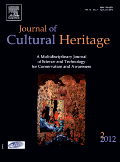
JOURNAL OF CULTURAL HERITAGE
Unveiling Stories Through Heritage Studies.JOURNAL OF CULTURAL HERITAGE, published by Elsevier France - Éditions Scientifiques Médicales Elsevier, is a pivotal academic journal dedicated to the multifaceted study of cultural heritage, including its conservation, anthropology, archaeology, and related fields. With an impressive standing in the academic community, this journal has achieved a Q1 ranking in Anthropology, Archaeology, Conservation, and History, reflecting its critical influence and contribution to these disciplines. The journal serves as a vital resource for researchers, professionals, and students interested in innovative research and developments concerning cultural heritage practices and policies. Although it operates under a subscription model, it provides access to innovative research and insights from the field, making it essential for those engaged in the preservation and study of cultural artifacts and historical narratives.

SCHWEIZERISCHES ARCHIV FUR VOLKSKUNDE
Exploring the Rich Tapestry of Folk CultureSCHWEIZERISCHES ARCHIV FUR VOLKSKUNDE, with ISSN 0036-794X, is a vital resource for scholars and practitioners in the fields of Arts and Humanities and Cultural Studies. Published by G KREBS VERLAGSBUCHHANDLUNG AG in Switzerland, this journal plays a crucial role in advancing the discourse surrounding folk culture, traditions, and anthropology. Despite its current ranking in the Q4 category for both Arts and Humanities and Cultural Studies, the journal serves as an essential platform for disseminating unique research findings and insights, contributing to a well-rounded understanding of diverse cultural practices. Researchers, professionals, and students are encouraged to explore the rich content produced between 2008 and 2014, and from 2017 to 2023, which reflects a commitment to fostering a multidisciplinary approach to folklore studies. By addressing the complexities of cultural dynamics, the journal not only promotes scholarly engagement but also enriches the academic community’s appreciation of folk traditions.
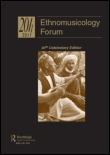
Ethnomusicology Forum
Unveiling the Rich Tapestry of Global Music TraditionsEthnomusicology Forum is a premier journal dedicated to the interdisciplinary study of music within its cultural contexts, published by Routledge Journals, Taylor & Francis Ltd. With an ISSN of 1741-1912 and an E-ISSN of 1741-1920, this journal plays a crucial role in advancing the field of ethnomusicology, offering insights into the diverse musical expressions found across the globe. As part of the academic landscape in the United Kingdom, the journal has established a commendable reputation, achieving Q2 rankings in both Anthropology and Music categories in 2023. Also noteworthy is its Scopus ranking, placing it in the 76th percentile in the Arts and Humanities category for Music and the 57th percentile in Social Sciences for Anthropology, reflecting its impact and scholarly importance. The Ethnomusicology Forum seeks to engage researchers, professionals, and students alike, providing a platform for innovative approaches to understanding music's role in society. Published annually and designated for a wide range of scholarly articles, the journal is essential for anyone looking to deepen their knowledge of music's cultural significance and its anthropological implications.

Revista Espanola de Antropologia Americana
Illuminating the Dynamics of American AnthropologyRevista Española de Antropología Americana, published by UNIV COMPLUTENSE MADRID, SERVICIO PUBLICACIONES, stands as a significant contribution to the field of anthropology, particularly focusing on American societies and cultures. Since its inception in 1970, this journal has evolved, with issues currently being published until 2024, providing a platform for original research, reviews, and scholarly discourse. Despite being a Q3 category journal in the 2023 rankings, it plays a pivotal role in disseminating knowledge and stimulating academic debate within the anthropology community. With an ISSN of 0556-6533 and an E-ISSN of 1988-2718, Revista Española de Antropología Americana strives to engage researchers, professionals, and students with insightful content that reflects the dynamic nature of cultural studies. Although it operates under traditional access models, the rich array of topics covered ensures its relevance to ongoing scholarly conversation in social sciences and anthropology. Addressing a diverse array of anthropological themes, this journal is essential for anyone looking to deepen their understanding of the cultural frameworks shaping American societies.

Ethnologia Scandinavica
Preserving Heritage through Contemporary Cultural InquiryEthnologia Scandinavica is a distinguished journal published by Swedish Science Press, dedicated to advancing the field of Scandinavian ethnology and cultural studies. With its ISSN 0348-9698, this journal has become an important platform for original research that explores the rich tapestry of cultural practices, traditions, and social dynamics within Scandinavian societies. Although not currently available through open access, the journal provides valuable insights that are often utilized by researchers, professionals, and students alike. Since its inception in 1984, Ethnologia Scandinavica has fostered scholarly discourse and serves as a crucial resource for those looking to deepen their understanding of ethnological perspectives in Scandinavia. Staying abreast of contemporary cultural issues and historical contexts, this journal plays an essential role in promoting academic inquiry and preserving the invaluable cultural heritage of the region.
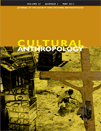
CULTURAL ANTHROPOLOGY
Unveiling the Nuances of Cultural NarrativesCULTURAL ANTHROPOLOGY is a premier journal in the field of anthropology, published by the esteemed SOC CULTURAL ANTHROPOLOGY. With an impressive impact factor and ranking in the Q1 category for both anthropology and arts and humanities, it stands as a leading platform for scholarly discourse and innovative research. Since transitioning to Open Access in 2014, the journal has made substantial contributions to the accessibility of anthropology literature, allowing a broader audience to engage with cutting-edge anthropological insights and findings. The journal's scope encompasses a wide range of cultural studies and anthropological perspectives, catering to a diverse readership that includes researchers, professionals, and students. Published from the Department of Anthropology, Rice University in Houston, Texas, CULTURAL ANTHROPOLOGY continues to shape the conversation in its field, promoting interdisciplinary dialogue and enriching the academic landscape.
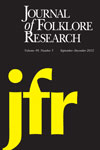
JOURNAL OF FOLKLORE RESEARCH
Advancing Knowledge in Folklore and Cultural StudiesJOURNAL OF FOLKLORE RESEARCH, published by Indiana University Press, serves as a vital platform for scholarly exploration within the realms of folklore, cultural studies, and music. With an ISSN of 0737-7037 and an E-ISSN of 1543-0413, this journal has converged its content from 2002 to 2024, facilitating a dynamic discourse on the interplay of traditional narratives and contemporary cultural forms. Despite its current tier in the Q4 category for both Cultural Studies and Music, the journal is increasingly recognized for its contributions, ranking 69th in Music and 526th in Cultural Studies as per the latest Scopus metrics. Researchers, professionals, and students alike will find this journal an essential resource, rich with insights that traverse the complexities of human expression and societal narratives. Although not an open-access journal, the valuable research contained within its pages is crucial for advancing knowledge in folklore scholarship and its related disciplines.